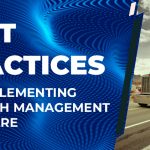
On 3rd February, ATA President and CEO Chris Spear appeared before a committee on Capitol Hill to influence lawmakers on a range of matters that affect trucking. This highly anticipated hearing drew attention from industry experts, stakeholders, and the general public, making it crucial to understand the key takeaways from the testimony.
This blog will examine Spear’s four most impactful insights and what they mean for the trucking industry. From drug testing to the IC model, these takeaways provide valuable insights into the current state of affairs and future developments in the industry.
The IIJA financing memo from FHWA must be withdrawn.
When collecting federal funds from the Bipartisan Infrastructure Law, the Federal Highway Administration encouraged states to prioritize non-highway modal projects and road maintenance above new highway capacity in a document published late last year. This advice goes against the spirit of the law as drafted by Congress. It carries the risk of diverting funds from important initiatives that would increase freight mobility, including bottlenecks on the highway, intermodal connectors, and truck parking capacity.
It is essential to consider the specific reasons and implications before advocating for withdrawing the financing memo from FHWA under the IIJA program. The decision to withdraw a financing memo would likely involve a review process and coordination with relevant stakeholders and decision-makers.
It’s high time California faces the facts regarding net-zero deadlines.
We must have frank discussions regarding our nation’s energy and environmental policy. The ATA and EPA have collaborated for four decades to create phases I and II pollution reduction guidelines. 98.5% of all emissions have been taken out of our tailpipes as of this point. In actuality, 60 trucks emit today what 1 truck did in 1988. The question is not if we will reach zero but rather when. We’ll get there, just not on California’s suggested schedules.
They will fail because they rushed to zero, making their schedule and goals impractical. Millions of 5,000 lb. truck batteries, the charging infrastructure, and the additional electricity required to power our trucks at total capacity have yet to be created. They are likely to wait to do so. We’ve demonstrated our dedication to a cleaner environment. We must approach the future with fair and honest attitudes.
Congress must protect the IC model.
Some members of Congress and federal and state regulators frequently criticize the independent contractor business model. The AB-5 law in California has created havoc on ICs, compelling many motor carriers to completely reorganize their corporate structures or leave the state.
As Spear demonstrated in his statement, these atrocious laws deprive many industrious entrepreneurs of the opportunity, dream, and freedom to operate their firms. They also pose a threat to the supply chain.
The administration must increase drug testing.
Legalizing recreational marijuana in multiple states has raised concerns about its impact on highway safety. As the use of marijuana becomes more prevalent, it becomes increasingly crucial for the federal government to take steps to ensure the safety of drivers on the roads.
One solution to mitigate the impact of marijuana on highway safety is implementing more robust safety standards, including allowing motor carriers to use hair testing, rather than just urinalysis, for screening. Hair testing provides a longer window of detection, allowing for a more accurate determination of whether a driver has used marijuana in the recent past.
Incorporating hair testing as a part of the screening process for commercial drivers would provide a more comprehensive assessment of an individual’s drug use and help to reduce the risk of impaired driving on our roads. By taking steps to address the impact of marijuana on highway safety, the federal government can help to ensure the safety of all drivers and passengers on the road.
Conclusion
In conclusion, Chris Spear’s testimony on Capitol Hill provided essential insights into the current state of affairs and future developments in the trucking industry. From withdrawing the IIJA financing memo from FHWA to the need for increased drug testing, these four takeaways highlight the pressing issues faced by the industry.
It is vital for the trucking industry to have open and candid discussions about these matters, as they significantly impact the safety of drivers and passengers on the roads. The federal government must work with industry stakeholders to address these concerns and find solutions that ensure everyone on the streets is safe and well. The ATA’s commitment to a cleaner environment and the importance of protecting the IC model are crucial elements that must be considered in these discussions. Ultimately, the key takeaways from Chris Spear’s testimony will shape the future of the trucking industry and its role in keeping our roads safe.
The TMS-Digital’s driver safety module offers a comprehensive solution to address one of these issues by incorporating drug testing into its offering. With features like an in-depth drug test section, setup, reports, and random driver selection, TMS-Digital’s module provides an effective solution for ensuring the safety of drivers on the roads. These takeaways from Spear’s testimony highlight the significance of finding solutions to the various challenges facing the trucking industry, and TMS-Digital’s driver safety module is one such solution that provides peace of mind for both trucking companies and the general public. Contact us today and take the first step toward safety.










